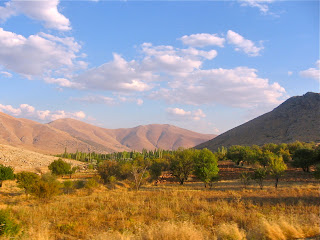As many of you know, I recently took (and
survived) the Cambridge CELTA course - I took it despite having taught for over
five years because I no longer wished to be a very good “corporate trainer”
(translation: teacher in a suit) who happened to not be certified. I wanted to
be a fantastic teacher with a real qualification. I chose CELTA because it was the only
certification program that I felt I would really learn from after five years of
teaching.
And I did – I felt that besides learning some new ideas and techniques for good teaching, that teaching 8 lessons and being critically assessed on all of them was extremely good for me. I went into the course thinking that timing and half-assed lesson planning were my problems, but learned that it’s in fact timing and Teacher Talking Time that I need to work on. Simply having a qualified person assess my teaching and give me action points was an immensely helpful learning experience. No other certification program would have given me that.
And I did – I felt that besides learning some new ideas and techniques for good teaching, that teaching 8 lessons and being critically assessed on all of them was extremely good for me. I went into the course thinking that timing and half-assed lesson planning were my problems, but learned that it’s in fact timing and Teacher Talking Time that I need to work on. Simply having a qualified person assess my teaching and give me action points was an immensely helpful learning experience. No other certification program would have given me that.
So, yes, all you other CELTA folks out
there, I did get a Pass A (provisionally, but I have every reason to believe
that that will be my final grade as well). After five years of experience and
knowing from feedback, the clients I was given and their subsequent renewals
that I was good – if not great – at my job, I’m happy to see that my grade
reflects that (although I would have been fine with a B – that was the grade I
was prepared to receive). For those who don’t know, about 70% of everyone who
takes the CELTA gets a regular “Pass”. 25-27% get a Pass B and 3-5% get a Pass
A.
There are a lot of personal experiences
scattered about the Interwebs on taking the CELTA, especially the gruelling
four-week course. At least one good post on the topic covers the writer’sexperience getting a Pass B, with tips on how readers can attempt the same.
There are none chronicling the experience of someone who got a Pass A, which is
why I’m writing this at all.
I can’t tell you “how” to get a Pass A,
because even having got one, I don’t really know how it’s done. The criteria
for the various grades are never clearly outlined – there is no (known) formula
that says “if you get this many Above Standards on your lessons” or something,
that automatically translates into a Pass A or B”. *
What I can say is that it was
extraordinarily difficult, despite having come in with a lot of experience.
I’ll be honest: I found the input sessions mostly easy (although I did learn a
few things and pick up lots of ideas and techniques, broadening my repertoire),
the written assignments not difficult in their content but certainly difficult
in terms of the time and attention to detail it took to turn in something truly
great. I did find the actual teaching to be a challenge – partly because my own
style was a bit higher on the Teacher Talking Time that CELTA so rails against,
and partly because being assessed and critiqued in great detail on a relatively
short lesson that comes between two other lessons that other trainees planned
is quite different indeed from how I teach at my actual job.
Basically, even with experience I had to
work extraordinarily hard to hand in work and perform at a level that
eventually earned me the A, and I don’t see how I could have done it without
prior experience. I’d attend class all day, come home and work for up to four
hours straight. In every other aspect of life I reverted to someone who has the
mentality of a five-year-old because I was just so mentally shot to hell from
how hard I was working. I ate kids’ food and drank a lot of whiskey. I worked
all weekend almost every weekend (on the final weekend I managed to take Sunday
off). I obsessed over lesson plans and nearly get headaches just thinking aout
the level of detail I included in my Procedure pages. I stopped blogging, I stopped
reading, I stopped watching TV and didn’t even check e-mail all that often – I
did keep Facebook open in the background at all times though.
I highly doubt that someone on the CELTA
course with zero teaching experience could get a Pass A unless they were
preternaturally talented or had some indirect experience (ie one of their
parents was a teacher or some such – that kind of exposure does have value). A
Pass B would be possible, but a person with no experience who managed that
would still have to be exceptionally talented.
I did note a few things that might have
helped bump me from a B to an A. While there’s no set number of Above Standards
that one needs in order to get an A or B, clearly the more you get, the better
your chances are. The poster in the link above got 6 out of 9 Above Standards
and got a B. I got 5 out of 8. Another trainee in my group – who was extremely
good and actually had a teaching certificate already, just not for TEFL – got 6
out of 8, but I’m not sure what his final grade was. Another girl in another
group also got 6 out of 8, but I’m not sure of her final grade, either. If more
than half of your TPs are Above Standard, you’ll probably make it into the
upper grades…or you’re far more likely, at least.
They tell you that as long as you pass all
of your written assignments, it doesn’t matter how well you do on them, because
it’s an overall Pass/Fail (and it is clearly announced that if you fail one
assignment, you can pass the course but you can’t get a Pass A). That said, my
final report noted that all of my written assignments were “of a very high
standard” and that I passed all of them with no resubmissions. The fact that
this was noted makes me believe that it had some impact on getting the A.
The tutors look in great detail at lesson
plans, and this is one area in which I excelled – I mentioned above how I would
give myself headaches over the level of detail I included. Every stage had ICQs
and CCQs mapped out. If I was going to model instructions, I noted that, and
how I would model them (with a student, with the board etc.). I was very detailed in writing out what the
students would do in each stage and I was very careful to check my Interaction
Patterns to make sure there was as little T-Ss as possible. If your Procedure
page for a 40-minute lesson reaches 3 or even 4 pages, you know you’re on the
right track.
I was careful to use any new thing from a recent input session as soon as it was appropriate, and note that in my lesson plans, as well. In the real world you don’t need to do this, but if you If you’re really trying to excel, listen carefully to little things the tutors say: if you hear a tutor mention that using “teach” and “learn” in your aims or stage aims is a bad idea (and it is – “teach” is too teacher-centered and “learn” is too general), then don’t use those verbs in your aims. If they say “for any language focus, create a context and cover meaning, form and pronunciation”, well, do that. Every time. Even if you have to write that down on a piece of scrap paper and tape it over your computer.
Which, yes, boils down to “do what the
tutors tell you”, but hey. Oh well. They’re tutors for a reason.
Other things that I felt worked in my
favor: strong language awareness**, good rapport with students, confidence, good
instructions, ability to adapt and create materials, good anticipation of
problems, participation in input sessions and “professionalism” (be on time,
don’t look skeevy, get on well with other trainees and coordinate lesson flow
with those in your group, show leadership skills), and strong self-reflection
and reaction to feedback.
Of course, a lot of this is easier said
than done. I can say “oh you should cultivate a strong rapport with students” –
yeah, great, but how do you do that? I can’t tell you. I know what works for
me, but everyone’s style is different. This is why teaching is a lot harder
than people give it credit for (and the profession has a surprisingly high
number of detractors). There are no easy answers to things like “how to improve
rapport” – it’s very touchy-feely. There are fewer clear answers in education
than in other professions.
No guarantees or promises that doing all of
this will get you an A, or even a B (like I said, I can’t tell you how to do
that), but these are things tutors noted as my strengths, and a few of them
were things that tutors openly said were important – for example, one tutor
said quite clearly that a Pass A trainee “shows a high degree of
professionalism, which includes being on time” (there were some late students).
It’s also quite clearly possible to get a
Pass A while still having areas requiring improvement – even serious ones. I
personally need to reduce my Teacher Talking Time. It’s hard for me to do,
because I’m a naturally chatty person and I do have a strong personality. I
like to really get to know my students, and I like for them to really get to
know me, which often translates into my being more talkative and more at the
front of the class than I really should be. If you know you have a similarly
serious action point, but have shown clearly that you are taking steps to
improve, are aware of the problem and are open to feedback on it, then it is
still possible to finish the course while still needing to work on the issue,
and get an A nonetheless.
I could also stand to work on my timing, and my lead-ins tend to take too long. I tend to latch on to a few great ideas and over-use them, for example doing similar lead-ins for each class (not on any report, I just know that I do that). When I get nervous, my eye contact shoots to hell and at least in the beginning my board work was a mess (much improved, still not perfect).
Basically, I’m far from a perfect teacher.
I’m good, and I’m not shy about the fact that I’m good – I am so totally not
into the paradigm where women and people in professions dominated by women are
shot down if they are anything less than humble, if not self-deprecating, and
goodness forbid you be confident or (gasp) self-promoting. I’m not perfect,
though, and I could be a hell of a lot better. If someone like me who still has
a lot to work on can get an A, clearly it is a goal that need not be dismissed
as impossible (although if you have no experience at all, you are probably
better off shooting for a B).
So, what real advice can I give? Not much,
except this: if you set up your goal as “I’m gonna gits me an A!” then, well,
it’s a worthy goal and all, but you’ll probably give yourself an ulcer, and
stress so much about whether you’re doing enough or doing well enough that your
freaky-outy stress will cause you to lose focus and actually do worse. Don’t
look for a magic bullet or secret formula – there is none, and trying to guess
at the magical combination of factors that leads to an A will just cause you to
get even more freaky-outy. Always remember that it’s not a competition, so if
you see someone who seems to be doing better than you, hey, you’re in it for
four weeks with that person and you are quite possibly friendly with them – you
are not in a race. There is not just one gold medal. Their good work does not
mean you’ll get edged out for the one top spot, because there is no “one” top
spot.
It sounds like a cliché but it’s really
true: just work your ass off, do the best work you can do and don’t freak out
(because that will affect your work). Remember
that the course is designed for people with no experience. Things you can do
immediately, that take no innate or learned skill are to participate as much as
you can in input, do your damnedest to provide as much detail as you can in
your lesson plans, be on time and be receptive to feedback (defend yourself if
you feel something said was really unfair, or explain your rationale, but don’t
get defensive or argumentative). If you
are given a language focus to teach, learn everything you can about it
(especially if it’s grammar), beyond what the textbook says. Even if you don’t
plan to teach every aspect, know everything you can to better cope with
questions or issues that may arise.
*One tutor said something along the lines of "We know we're not turning out perfect teachers, that's impossible in four weeks. After the CELTA you'll still need training. A Pass A tells employers that you can start teaching immediately with basically no training and little support. A Pass B tells them that you will need a lot less training than most new hires, but still require some. A Pass tells them that you are an average passing trainee, will need further training and support, but you did absorb the fundamentals taught on the CELTA."
**About that language awareness thing –
yeah. It’s tough, even with experience and especially with no experience. Don’t
be afraid – when I started teaching, I was all “modal? WTF is a modal?” – which
of course meant that I was not the best teacher. I learned, though, and I got
better. I picked up my language awareness because I had to teach it. Actually
teaching it did far more for my own in-depth language awareness than reading a
grammar book ever could have done. If you find yourself, the night before a
lesson, flipping through web pages or reference books going “WTF is a modal?”,
don’t worry, you’re not the only one, and the next time you have to teach it,
you’ll know it. You’ll get better. You’ll learn it in far more depth and detail
than you ever thought possible because having to teach it does that – it forces
you to learn it in a somewhat high-pressure situation. So go out and buy
yourself a good grammar reference, pour yourself a drink and relax.







































































